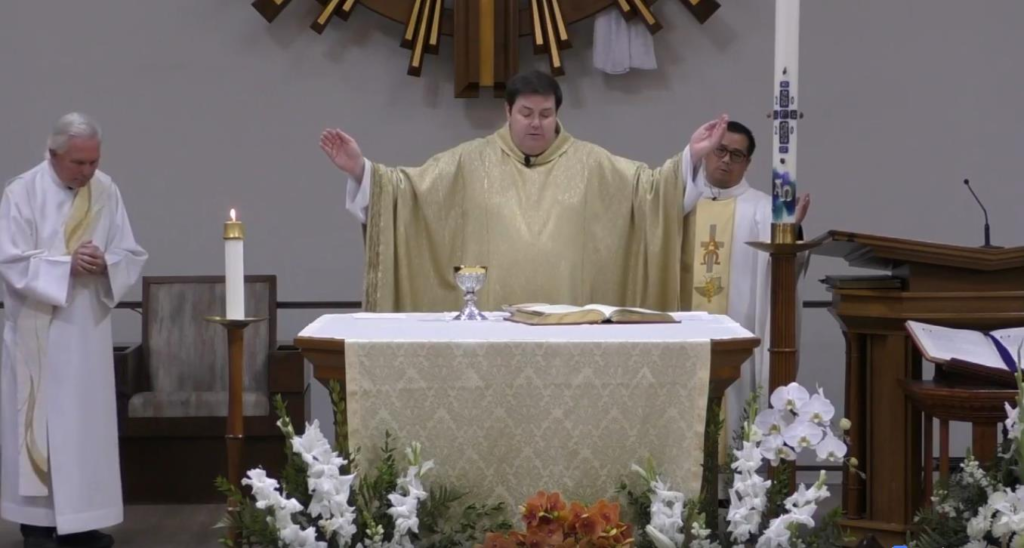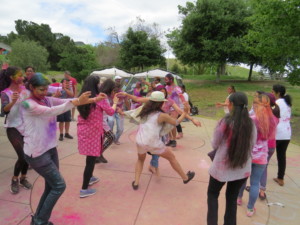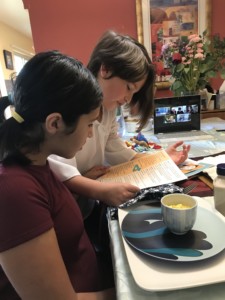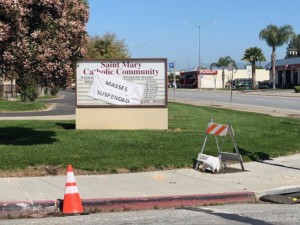Gilroy faithful still practicing religion while sheltering in place
Local believers deal with COVID-19 altering holidays and worship services

Photo courtesy St. Mary Parish
Father Michael Hendrickson celebrates Mass at St. Mary Catholic Church via the Internet. Masses have been suspended until further notice.
By Marty Cheek
The COVID-19 crisis and the social distancing requirements the pandemic has forced on global civilization is creating challenges for all South Valley faith groups. Congregations, however, are finding creative ways to worship and celebrate religious holidays.
Among the first local events cancelled was the Hindu festival Holi, which had been scheduled to take place Saturday March 28 at Morgan Hill’s Community Park. The Indian Association of South Santa Clara County, the organizers, made the decision early in March after the county issued an order to prevent gatherings of more than 100 people, said Poonam Chabra, the president of the group’s board.
 “Holi is a very popular Hindu festival where we celebrate the onset of spring,” she said. “It’s a festival of colors and a festival of love. But there’s also a Hindu mythology that is associated with it. Different parts of the country (of India) celebrate Holi for various reasons. It’s a great way to bring our community together and have our children be exposed to this rich culture and heritage, which is the primary reason for our association.”
“Holi is a very popular Hindu festival where we celebrate the onset of spring,” she said. “It’s a festival of colors and a festival of love. But there’s also a Hindu mythology that is associated with it. Different parts of the country (of India) celebrate Holi for various reasons. It’s a great way to bring our community together and have our children be exposed to this rich culture and heritage, which is the primary reason for our association.”
The festival involves physical contact as participants use their hands to dust other people’s faces and arms with colored powder, another reason the event was cancelled, she said.
“There’s a little bit of a sadness to cancel the event, but we’re all aware that this needed to happen considering where we are,” she said.
The Indian Association recently launched a humanitarian chapter to serve local families financially challenged by COVID-19 by collecting food and raising money. All proceeds and money is donated to the Edward Boss Prado Foundation nonprofit, she said.
Other faith-based organizations are seeing their own holiday celebrations changed because of COVID-19 and are using technology to create connections among worshipers. Among them is Congregation Emeth, a reform synagogue in Morgan Hill which serves many in the South Valley’s Jewish community. The members changed the Passover Seder meal celebration to a “Zeder” April 8 and 9 using the Zoom video-conferencing platform to connect family members for the special ritual feast, said Rabbi Debbie Israel.
“It was difficult and people did the best they could,” she said. “There was some resistance to the idea of doing what we’ve been calling Zeder at first, but I think most of us were surprised how well Zoom worked for our families.”
 COVID-19 presents a difficult social challenge for some members who live alone. The congregation has created a Caring Committee to phone these people each week to make sure they are OK, she said.
COVID-19 presents a difficult social challenge for some members who live alone. The congregation has created a Caring Committee to phone these people each week to make sure they are OK, she said.
“Like every house of religion, we’re doing the best we can to help people find their way spiritually and emotionally both with God and with each other,” she said. “It’s times like these when community is so important.”
The congregation is getting creative with the technology of Zoom. It held a video-conference program Sunday, April 19, with the founders of KAVOD, a nonprofit group assisting Holocaust survivors, one-third of whom are living in poverty, Israel said. The psychological lessons these survivors learned at the camps are relevant to the crisis society is now dealing with.
“On the one hand there is an ability to put things in perspective and to understand that, in good Jewish folklore, this too will pass,” she said. “And on the other hand to have faith in the future and do the best we can. I think we’re seeing a lot of that. I am hopeful that when this over, and I hope it will be over soon, we’ll remember these lessons as a community and care for one another in a warmer way out of love and not necessarily out of obligation.”
For Muslims, the month-long religious observation of Ramadan is a vital part of their faith activities as one of the Five Pillars of Islam. This year Ramadan started the evening of Thursday, April 24. The South Valley Islamic Community closed its mosque in San Martin in early March because of the COVID-19 public health crisis. It is a place where members normally would be able to gather at sundown during Ramadan, said Karen Musa, president of SVIC.
 “It’s had a big impact,” she said. “During the day we’re fasting and we would like to pray more and we would like the companionship of our community . . . At the end of Ramadan is our Eid (a festival of breaking fasting on May 23) and that is up in the air. We had everything booked for the celebration. I don’t think that’s going to happen. We’ll have to stay home. We can reach out to people online.”
“It’s had a big impact,” she said. “During the day we’re fasting and we would like to pray more and we would like the companionship of our community . . . At the end of Ramadan is our Eid (a festival of breaking fasting on May 23) and that is up in the air. We had everything booked for the celebration. I don’t think that’s going to happen. We’ll have to stay home. We can reach out to people online.”
Because of the closure of the mosque, members of the SVIC can listen to the imam present an online video talk every Friday to provide encouragement and guidance, Musa said.
“Thank God for technology and Zoom,” she said. “People are reaching out on emails and checking out to make sure people are well. It’s very nice and it makes you feel good.”
St. Mary Parish has had to face social and financial challenges from COVID-19, said Father Michael Hendrickson. Several staff members had to be laid off and others had their hours reduced because of the reduced offering collections. The church used to have 3,000 total parishioners at the Masses, but now that is limited to only 10 for each service.
“There are so many different impacts,” Hendrickson said. “Besides the most worrisome, which is the health of parishioners, as far as we know, we don’t have a lot of known parishioners with COVID-19, thank God. I think the bigger impact is economics.”
The coronavirus crisis has devastated the St. Mary’s population with unemployment, reduced hours, and hits to the small businesses. Hendrickson calls parishioners to ask how they are managing.
“It’s rare talking to a family that hasn’t had a lay-off or significantly reduced hours,” he said. “There are concerns about paying rent. The economic dislocation is extremely worrying.”
St. Mary’s services and Bible studies and other devotional classes are done online using the Zoom video-conferencing platform. St. Mary School, along with the 25 other parochial schools in the dioceses, have used technology for distance learning.
“It’s been a huge success in that the teachers are learning the online learning systems out there,” Hendrickson said. “The pace of learning is definitely slower than in the classroom. I think this experiment is showing that the classroom is not going away any time soon because the pace of instruction is slower.”
Like other faith houses, the Gilroy Presbyterian Church is using Facebook Live to stream services. The Easter Sunday service was watched by local people as well as people in Alaska, Michigan, Kentucky and even internationally in Cameroon.
“The streaming part is interesting because you have to learn how to talk to a camera,” said Pastor Trevor Van Laar. “That’s a whole lot different than talking to an audience. You’re trying to figure out if your points are landing with people or not. Even the silly stuff like if you have a joke or something, you don’t really get a response from that. It really changes how you approach the same thing.”
Morale is good in the congregation but some members are starting to experience the loss of jobs due to COVID-19 impacting businesses. Many also miss the interaction with other Christians they found in going to church for services and other social events.
“The one thing we’ve noticed is that people are pretty eager for a phone call,” Van Laar said. “Some of them are a little bit bored, a little bit lonely. For some of the older people, church is one of those places they look forward to catch up with friends and see family and be a part of the community. They’re missing the time together.”
COVID-19 shows the fragility of society in the midst of the crisis, Van Laar said.
“This is going to change how we do religion,” he said. “This is making us bring our game forward into the digital age. If we’re going to do any ministry through digital output such as video-conferencing, or Bible studies or Zoom-call for counseling, it’s going to be a game change for religion in general to try to move with this change.”
